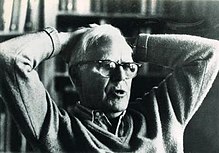Martin Gardner
| Martin Gardner | |
|---|---|
 |
|
| Born |
October 21, 1914 Tulsa, Oklahoma, US |
| Died | May 22, 2010 (aged 95) Norman, Oklahoma, US |
| Occupation | Author |
| Nationality | United States |
| Alma mater | University of Chicago |
| Genre | Recreational mathematics, puzzles, close-up magic, annotated literary works, debunking |
| Literary movement | Scientific skepticism |
| Notable works |
Fads and Fallacies in the Name of Science; Mathematical Games (Scientific American column); The Annotated Alice; The Whys of a Philosophical Scrivener; The Ambidextrous Universe |
| Notable awards |
Leroy P. Steele Prize for Mathematical Exposition (1987) George Pólya Award (1999) |
|
|
|
| Signature | |
| Martin Gardner | |
|---|---|
Martin Gardner (October 21, 1914 – May 22, 2010) was an American popular mathematics and popular science writer, with interests also encompassing scientific skepticism, micromagic, philosophy, religion, and literature—especially the writings of Lewis Carroll, L. Frank Baum, and G. K. Chesterton. He was considered a leading authority on Lewis Carroll. The Annotated Alice, which incorporated the text of Carroll's two Alice books, was his most successful work and sold over a million copies. He had a lifelong interest in magic and illusion and was regarded as one of the most important magicians of the twentieth century. He was considered the dean of American puzzlers. He was a prolific and versatile author, publishing more than 100 books.
Gardner was best known for creating and sustaining interest in recreational mathematics—and by extension, mathematics in general—throughout the latter half of the 20th century, principally through his "Mathematical Games" columns, which appeared for twenty-five years in Scientific American, and his subsequent books collecting them.
Gardner was one of the foremost anti-pseudoscience polemicists of the 20th century. His book Fads and Fallacies in the Name of Science, published in 1957, became a classic and seminal work of the skeptical movement. In 1976 he joined with fellow skeptics to found CSICOP, an organization promoting scientific inquiry and the use of reason in examining extraordinary claims.
Gardner, son of a petroleum geologist, grew up in and around Tulsa, Oklahoma. His lifelong interest in puzzles started in his boyhood when his father gave him a copy of Sam Loyd's Cyclopedia of 5000 Puzzles, Tricks and Conundrums. He attended the University of Chicago, where he earned his bachelor's degree in philosophy in 1936. Early jobs included reporter on the Tulsa Tribune, writer at the University of Chicago Office of Press Relations, and case worker in Chicago's Black Belt for the city's Relief Administration. During World War II, he served for four years in the U.S. Navy as a yeoman on board the destroyer escort USS Pope in the Atlantic. His ship was still in the Atlantic when the war came to an end with the surrender of Japan in August 1945.
...
Wikipedia
